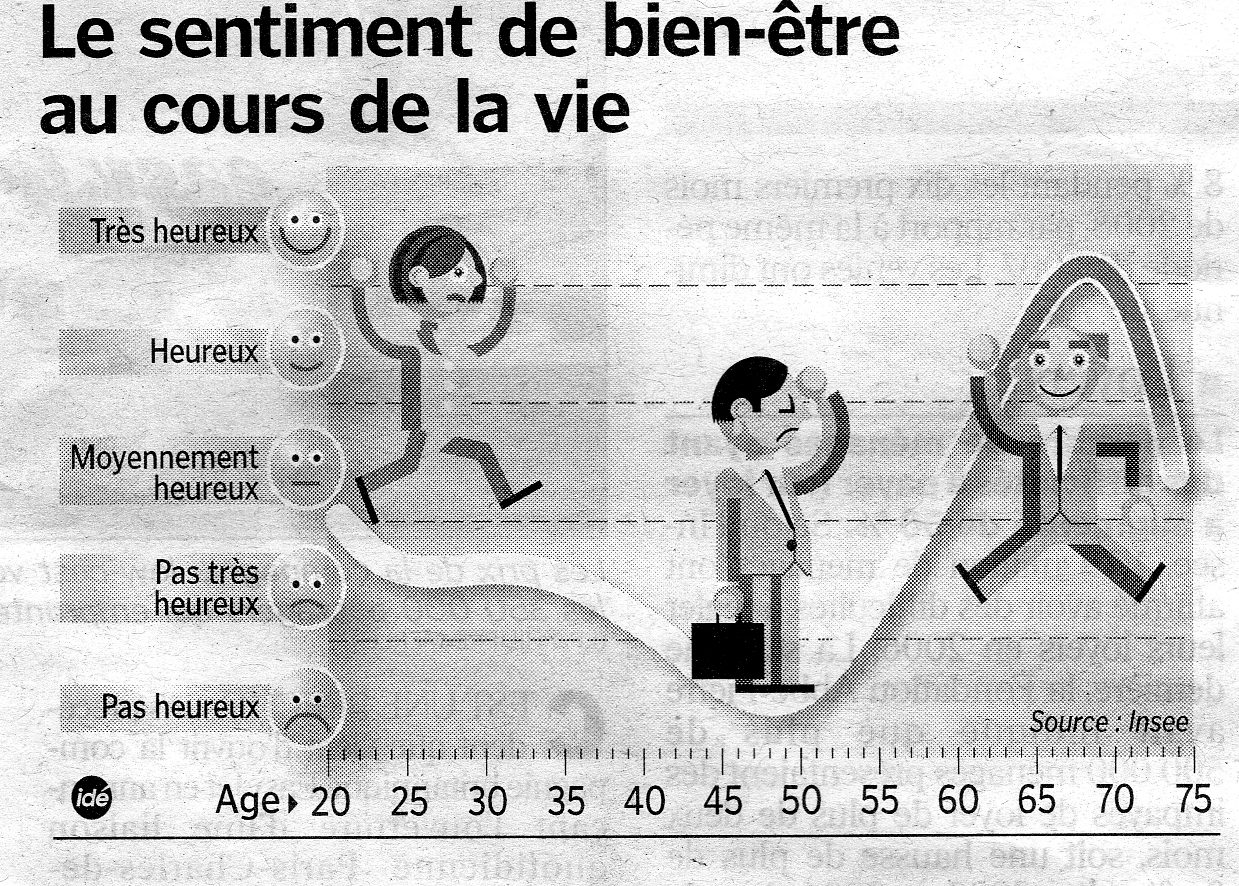|
| French
attitudes (#3) |
|
 (no, this
is NOT a hord of Frenchmen) (no, this
is NOT a hord of Frenchmen) |
|
|
|
|
| French shared values |
|
Are they happy ? |
According to all studies, the French share to following values :
Is there a French humor
?
The least we can say is that Americans rarely understand and appreciate French humor. One of the reasons is that the French love their language and a large part of their humor is based on it, which make it harder for non-French speakers to understand (see an example in the NYT).
-
"I believe that nothing
separates people more than their sense of humour" (Theodore
Zeldin)
-
As quoted by Hill (quoting Gruner), the French value
Wit (intellectual, hostile, aggressive, sarcastic, cynical) as
opposed to anglo-saxon Humour (emotional, affectionate, gentle,
kindly, genial). A quote : "French wit differs in its essence from Anglo-Saxon humour. It is more dependent on verbal felicity. It ranges from a mere happy accident of similar sound-the pun-to a shrewd criticism of society-the epigram. Always is it dependent on brilliance of language, on concise and sharp-pointed phrases. It thrusts like a rapier, and it is generally cruel. It wounds and mocks : it laughs at its object." (Huddleston)
|
|
All the studies show that 1/ the French declare that they are very unhappy with the society (and therefore they demonstrate, march in the streets, go on strike, etc.) and 2/ the same French declare that they are personnaly very happy, in their family, in their life etc. Below a few of these studies :
Who was unhappy in France in 2005 i.e.
what are the categories of people who were demonstrating or on
strike or both all over the country (according to Le Parisien
April 14, 2005) :
- High school students : huge
strikes and demonstrations (200,000) since January against a
reform of high school and baccalaureat (loi Fillon)
- Teachers : same reason
- Researchers : against public
budgets being too small
- Emergency ward doctors : on
strike for more staff
- Doctors (general practitioners)
against a reform of Social Security which (as they think) favours
specialists
- Doctors (specialists), God knows
why
- Judges : for some reason
- Prison wardens : for more staff
- Farmers against everyting, including
the European Agricultural Policy (of which they are the main
beneficiaries)
- Wine growers : for more public
subsidies to compensate the diminishing price of wine ; traditionally,
they block expressways and trash everything in city centers
- Fishermen : blocking harbors
to protest against the rising cost of petrol
|
-
Therefore, the French sense
of humour is more oriented toward others than themselves, less
nonsensical than English humour, more cruel and even mean. It is never self-deprecating
: it is combative, fueled by ridicule and mockery and it needs
a target.The French are great teases,
which contribute (for naive foreigners) to their reputation of
being rude
-
A frequent form of humor is
to exagerate excessively a statement to illustrate its falsehood
: if you are too literal, you just think it is silly (see on
this site an example, sometimes misunderstood)
-
The French love very earthy
jokes about sex and bodily functions ; you can hear them in the
most unexpected (for Americans) contexts, like at a dinner table
with well-educated people. Coluche,
whose jokes were literally impossible to translate, was immensely
popular. Because their language is so
important for them, they love puns, which are hard to follow
unless you speak very good French.
-
An example of humor that does not translate easily into English is the devastative and provocative humor of a magazine like Charlie Hebdo (vaguely : a sort of Mad magazine) who made fun of everything and particularly religions until the day of January 2015 when two fundamentalists Islamists surged into the weekly editorial conference and shot dead 8 journalists and cartoonists. The cartoons of Charlie Hebdo are brilliant but would be considered tasteless by American standards. (read more about it and see more about Charlie Heddo and its humor, that most Americans do not appreciate...)
-
The French love to joke about subjects that would scandalize
Americans : family, fidelity, moral values, etc. See an example about mistresses.
-
The most frequent " ethnic
jokes " in France are jokes about Belgians (supposed to
be stupid), or about Southerners (supposed to be lazy, in "Marius
et Olive" or Corsican stories) or Auvergnats (supposed to
be cheap).
-
Les Tontons Flingueurs (by Georges Lautner, 1963) is a cult movie for the French. It is the story of a retired gangster (Lino Ventura) who becomes the legaI guardian of the teenager daughter of his deceased gangster friend, who has been brought up to become a classy young lady. He has to run the business of a gangster and try to adjust to the way of life of the upper-middle class. I have never met a Frenchman, young or old, who does not like it and I have never met an American who enjoys it!
-
The French industry of comic strips is very active with more than 4,000 albums published per year, most of them for adults. Read more about it.
-
Read about French humour and movies
|
|
- All categories of employees
: one million (March 10) to defend the 35-hour week, for better
salaries and against the suppression of the Monday Pentacost
holiday
- Bank employees : for better
salaries
- Supermarket employees : same,
when they learned about the golden parachute of the former CEO
of Carrefour (39 million Euros)
- civil servants : one million
(March 10) for better salaries, higher pensions and for the defence
of " service
public "
- postmen : all over the country,
against the project of becoming a bank, which they call privatization
- tobacconists : blocking borders
against the rise of the price of cigarettes (an element of the
government's anti-cancer policy)
- "intermittents du spectacle" : for some (unknown) reason
- employees of record and music
industry : against the decrease of sales due to internet downloads
...and things have not changed since !
In France
you're happy if you're old!
In November 2008, the National Institute of Statistics (INSEE)
published its "Portrait Social de la France". (Source
: "Le Parisien", Nov.6, 2008)
| Among many
figures about income, equality, inflation, taxes, etc... there
is an interesting figure about the feeling of happiness ("Would
you say you are happy") with age.It is average at age 20,
then steadily decreasing until age 45/50, then up to a maximum
between 65 and 70 and then down again. |
 |
|
My favorite French jokes (I assume they are French)
- Q. How many Frenchmen does it
take to change a light bulb ?
A. Just one, to hold the bulb : the world revolves around him.
- Beethoven was so deaf that his
whole life long, he thought he was a painter
- Q. What's the quickest way to
make a profit ?
A. Buy a Frenchman for what he's worth and sell him for what
he thinks he's worth.
- Two monks are walking around
the monastery cloister reading their breviaries. One of them
is smoking a pipe : " Did the father superior agree you
could smoke ? " queries his colleague. " I asked him
if I could smoke my pipe when I was reading my breviary and he
said 'no!' " . "That was your mistake " replies
the first " I asked him if I could read my breviary while
I was smoking my pipe "
- More to come...
|
|
These
days, the French do not have very
high spirits :
- The main reasons are well-known : the economic situation is very bad, the French regret the loss of influence and power of their country, they have lost confidence in their politicians, they feel that their values and beliefs do not match with the new world, etc. More generally, the huge demonstrations by the Yellow Vests (winter 2018-2019) illustrated a very important factor : the French do not trust anyone ! In fact, they trust nobody except their mayor ! All the polls give the same result : the trust in all institutions (the presidency, the unions, the political parties, etc) rarely exceeds 20% but for the mayor the number is much higher (58% in 2018). More about mayors in France.
- the consumption of tranquilizers
is the highest in Europe (x 5 since 1980) : see
numbers
- national mood has been constaly decreasing over the
past 30 years (see the trend)
and a high proportion (13%) declares he/she "fears becoming
homeless", which is an amazing answer....
- young French people are much
more worried about their future than in other countries
(25,6% consider it promising as opposed to 54,01% in the US)
: see a comparative poll.
- BUT : they are collectively
un-happy and individually happy : in a 2006 survey they
gave the following (contradictory) answers : "are the French
happy?" : NO=70%, "are you happy ?" YES=80% !
(all the polls give the same result)
- This confirmed by an international survey (source : TNS Opinion, 2010, 32 714 people in 25 countries, in Le Figaro Jan 20, 2011)
- young Frenchmen are (relatively) optimistic for themselves (53%) but not for their country (17%) (for the USA, respectively 81% and 37%) ;
- the numbers are close between Germany and France on one side (the pessimists), USA and UK on the other side (the optimists)
- for young Frenchmen, globalization is more an opportunity than a threat for only 52%, compared to 91% for China (and 66% for Germany) ; more and more (educated) young French people choose to emigrate ;
- globally, all the results show that young Frenchmen consider that they are (personally) relatively happy and (collectively) quite unhappy. Another French paradox ?
Who is happy
: me ! (and few other
people : read Harriet's books : "French Toast - Heureuse comme une Américaine en France" and "Joie de Vivre : the Secrets of Wining, Dining and Romancing Like the French". |
| To related pages
: curious
behaviors (#1)and
more attitudes (#2), body language, Joie de Vivre in France,questions about the French,
French issues, anecdotes about life in Paris, French history, etc... |
|
To table
of contents
To top
of the page
Back to home
page
|
Harriet Welty
Rochefort writes articles and books about France and the French.
Order her books :
- "Joie de Vivre", Secrets of Wining, Dining and Romancing like the French, St.Martin's Press, New York, 2012
- "French Toast, An American in Paris
Celebrates The Maddening Mysteries of the French", St.Martin's Press,
New York, 1999
- "French Fried, The Culinary Capers
of An American in Paris", St.Martin's Press, New York, 2001
- "French
Toast - Heureuse comme une Américaine en France",
Ramsay, Paris 2005
More on Harriet's books (excerpts, upcoming
events, testimonials, etc..) |
| To email
me |
Together
or separately, Harriet and Philippe speak
about Intercultural Differences : click
here for information.
|
|